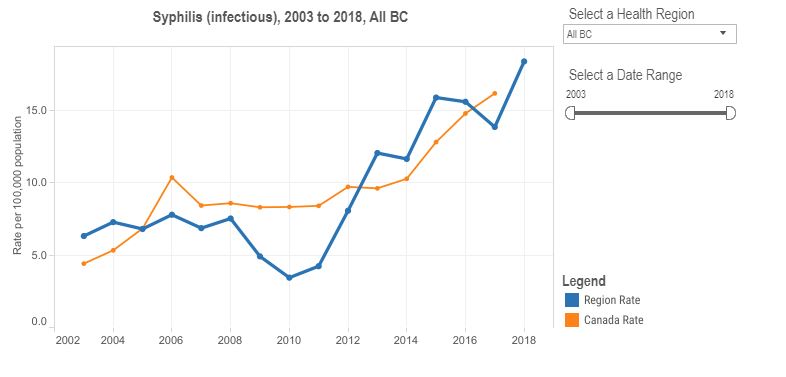The number of infectious syphilis cases in B.C. is at a 30-year high.
There were 919 new cases in 2018, a rate of 18.4 per 100,000 people.
That’s a 33 percent increase from 2017.
Sixteen of those cases were on the North Island, with 42 on the Central Island, 76 on the South Island, and 36 in the Coast Garibaldi Area, including Powell River.
Rates are 12.2 per 100,000 on the North Island, 14.4 per 100,000 on the Central Island, and 11.0 per 100,000 in the Coast/Garibaldi area.
Provincial Health Officer, Dr. Bonnie Henry, said after seeing syphilis infections decrease for several years, rates began to climb again earlier this decade.
“We’ve been working to address syphilis in B.C. and raise awareness about testing among men who have sex with men,” Henry noted. “We are currently working with our partners to see what more we can do to reduce the number of infections but we also need the public to be aware of the risk and to be proactive about testing and treatment.”
While syphilis continues to disproportionately affect gay and bisexual men in B.C., infections jumped 40 percent among women between the ages of 15 and 49 from 2017 to 2018.
The BC Centre for Disease Control (BCCDC) is reminding you to speak with your health care professional about testing for sexually transmitted infections, especially if you have new sexual partners, or if you are pregnant.
You can get syphilis through oral, vaginal and anal sexual contact or close skin-to-skin contact to a syphilis lesion or rash.
Syphilis can also be transmitted from a pregnant woman to their unborn child in pregnancy or during childbirth.
About syphilis
- Symptoms can include a hard painless sore usually on the genitals or other sites of contact such as the mouth or anus. Other symptoms can include a flat, red skin rash on the back, chest, hands or feet, fever, swelling of the glands, genital rash, hair loss and fatigue.
- A blood test can be done to check if you have syphilis.
- Syphilis is curable with antibiotics, and the earlier the treatment, the more likely that complications will be prevented. Early diagnosis and treatment will also prevent transmission. If treated at a later stage, antibiotic treatment cannot undo the damage already caused by syphilis, but it can prevent further health complications.
- People can get syphilis multiple times in their life.
- Use of condoms during close and/or sexual contact works well to reduce your chances of getting or transmitting syphilis. Be aware that you can still get syphilis with a condom because syphilis sores can occur in places not covered by a condom.
- If you are pregnant, you should be screened for syphilis by your maternity care provider during the first trimester and again around the time of delivery. You can transmit syphilis to your baby during pregnancy or delivery. Congenital syphilis can have serious health effects on your baby. In severe cases, it can lead to stillbirth or death.
- Get tested regularly for STIs, especially if you have signs or symptoms, a new sexual partner, multiple partners or if you have a sexual partner who has tested positive for syphilis.




